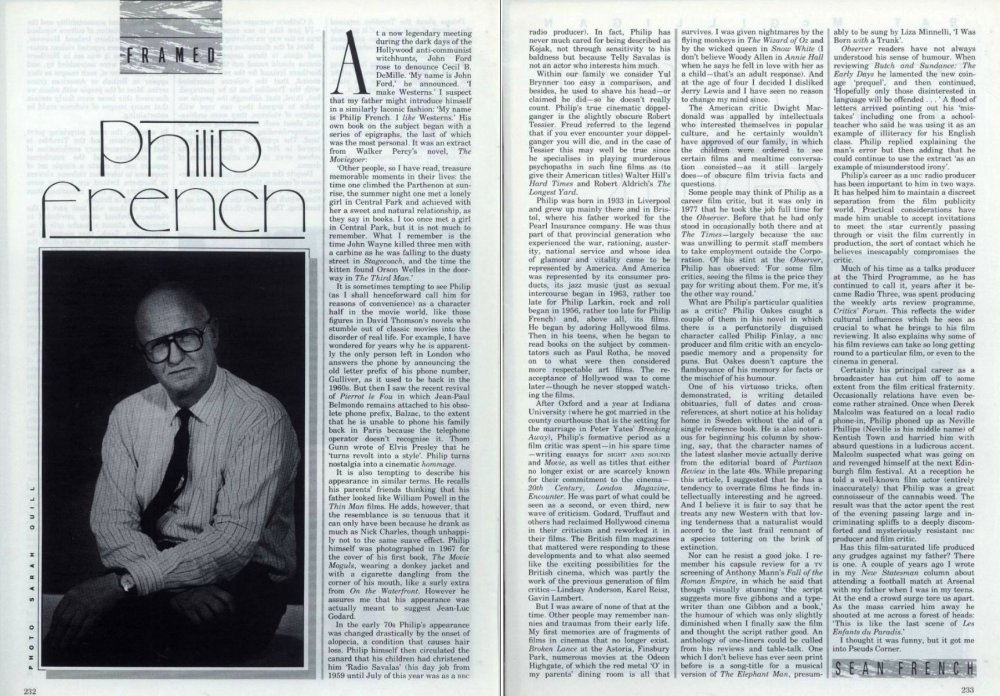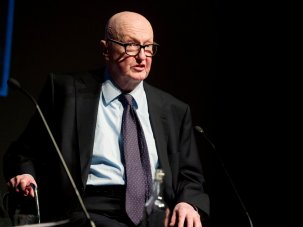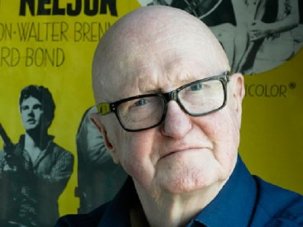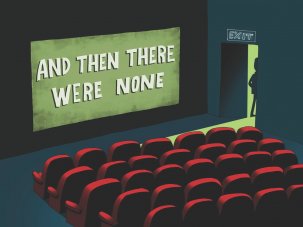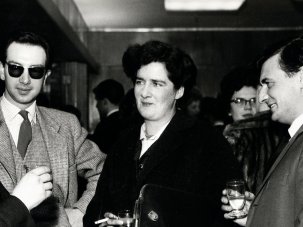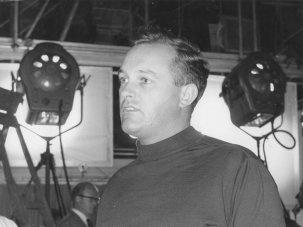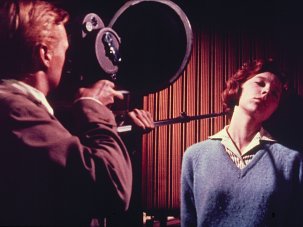At a now legendary meeting during the dark days of the Hollywood anti-communist witchhunts, John Ford rose to denounce Cecil B. DeMille. “My name is John Ford,” he announced. “I make westerns.” I suspect that my father might introduce himself in a similarly laconic fashion: “My name is Philip French. I like westerns.”
His own book on the subject began with a series of epigraphs, the last of which was the most personal. It was an extract from Walker Percy’s novel, The Moviegoer: “Other people, so I have read, treasure memorable moments in their lives: the time one climbed the Parthenon at sunrise, the summer night one met a lonely girl in Central Park and achieved with her a sweet and natural relationship, as they say in books. I too once met a girl in Central Park, but it is not much to remember. What I remember is the time John Wayne killed three men with a carbine as he was falling to the dusty street in Stagecoach, and the time the kitten found Orson Welles in the doorway in The Third Man.”
It is sometimes tempting to see Philip (as I shall henceforward call him for reasons of convenience) as a character half in the movie world, like those figures in David Thomson’s novels who stumble out of classic movies into the disorder of real life. For example, I have wondered for years why he is apparently the only person left in London who answers the phone by announcing the old letter prefix of his phone number, Gulliver, as it used to be back in the 1960s. But then I saw the recent revival of Pierrot le Fou in which Jean-Paul Belmondo remains attached to his obsolete phone prefix, Balzac, to the extent that he is unable to phone his family back in Paris because the telephone operator doesn’t recognise it. Thom Gunn wrote of Elvis Presley that he “turns revolt into a style”. Philip turns nostalgia into a cinematic hommage.
It is also tempting to describe his appearance in similar terms. He recalls his parents’ friends thinking that his father looked like William Powell in the Thin Man films. He adds, however, that the resemblance is so tenuous that it can only have been because he drank as much as Nick Charles, though unhappily not to the same suave effect. Philip himself was photographed in 1967 for the cover of his first book, The Movie Moguls, wearing a donkey jacket and with a cigarette dangling from the corner of his mouth, like a surly extra from On the Waterfront. However he assures me that his appearance was actually meant to suggest Jean-Luc Godard.
In the early 70s Philip’s appearance was changed drastically by the onset of alopecia, a condition that causes hair loss. Philip himself then circulated the canard that his children had christened him ‘Radio Savalas’ (his day job from 1959 until July of this year was as a BBC radio producer). In fact, Philip has never much cared for being described as Kojak, not through sensitivity to his baldness but because Telly Savalas is not an actor who interests him much. Within our family we consider Yul Brynner too easy a comparison, and besides, he used to shave his head – or claimed he did – so he doesn’t really count. Philip’s true cinematic doppelgänger is the slightly obscure Robert Tessier. Freud referred to the legend that if you ever encounter your doppelgänger you will die, and in the case of Tessier this may well be true since he specialises in playing murderous psychopaths in such fine films as (to give their American titles) Walter Hill’s Hard Times and Robert Aldrich’s The Longest Yard.
Philip was born in 1933 in Liverpool and grew up mainly there and in Bristol, where his father worked for the Pearl Insurance company. He was thus part of that provincial generation who experienced the war, rationing, austerity, national service and whose idea of glamour and vitality came to be represented by America. And America was represented by its consumer pro-ducts, its jazz music (just as sexual intercourse began in 1963, rather too late for Philip Larkin, rock and roll began in 1956, rather too late for Philip French) and, above all, its films. He began by adoring Hollywood films. Then in his teens, when he began to read books on the subject by commentators such as Paul Rotha, he moved on to what were then considered more respectable art films. The re-acceptance of Hollywood was to come later – though he never stopped watching the films.
After Oxford and a year at Indiana University (where he got married in the county courthouse that is the setting for the marriage in Peter Yates’ Breaking Away), Philip’s formative period as a film critic was spent – in his spare time – writing essays for Sight & Sound and Movie, as well as titles that either no longer exist or are scarcely known for their commitment to the cinema – 20th Century, London Magazine, Encounter. He was part of what could be seen as a second, or even third, new wave of criticism. Godard, Truffaut and others had reclaimed Hollywood cinema in their criticism and reworked it in their films. The British film magazines that mattered were responding to these developments and to what also seemed like the exciting possibilities for the British cinema, which was partly the work of the previous generation of film critics – Lindsay Anderson, Karel Reisz, Gavin Lambert.
But I was aware of none of that at the time. Other people may remember nannies and traumas from their early life. My first memories are of fragments of films in cinemas that no longer exist. Broken Lance at the Astoria, Finsbury Park, numerous movies at the Odeon Highgate, of which the red metal ‘0’ in my parents’ dining room is all that survives. I was given nightmares by the flying monkeys in The Wizard of Oz and by the wicked queen in Snow White (I don’t believe Woody Allen in Annie Hall when he says he fell in love with her as a child – that’s an adult response). And at the age of four I decided I disliked Jerry Lewis and I have seen no reason to change my mind since. The American critic Dwight Macdonald was appalled by intellectuals who interested themselves in popular culture, and he certainly wouldn’t have approved of our family, in which the children were ordered to see certain films and mealtime conversation consisted – as it still largely does – of obscure film trivia facts and questions.
Some people may think of Philip as a career film critic, but it was only in 1977 that he took the job full time for the Observer. Before that he had only stood in occasionally both there and at The Times – largely because the BBC was unwilling to permit staff members to take employment outside the Corporation. Of his stint at the Observer, Philip has observed: “For some film critics, seeing the films is the price they pay for writing about them. For me, it’s the other way round.”
What are Philip’s particular qualities as a critic? Philip Oakes caught a couple of them in his novel in which there is a perfunctorily disguised character called Philip Finlay, a BBC producer and film critic with an encyclopaedic memory and a propensity for puns. But Oakes doesn’t capture the flamboyance of his memory for facts or the mischief of his humour. One of his virtuoso tricks, often demonstrated, is writing detailed obituaries, full of dates and cross-references, at short notice at his holiday home in Sweden without the aid of a single reference book. He is also notorious for beginning his column by show-ing, say, that the character names of the latest slasher movie actually derive from the editorial board of Partisan Review in the late 40s. While preparing this article, I suggested that he has a tendency to overrate films he finds intellectually interesting and he agreed. And I believe it is fair to say that he treats any new western with that loving tenderness that a naturalist would accord to the last frail remnant of a species tottering on the brink of extinction.
Nor can he resist a good joke. I remember his capsule review for a TV screening of Anthony Mann’s Fall of the Roman Empire, in which he said that though visually stunning “the script suggests more five gibbons and a typewriter than one Gibbon and a book,” the humour of which was only slightly diminished when I finally saw the film and thought the script rather good. An anthology of one-liners could be culled from his reviews and table-talk. One which I don’t believe has ever seen print before is a song-title for a musical version of The Elephant Man, presumably to be sung by Liza Minnelli, I Was Born with a Trunk.
Observer readers have not always understood his sense of humour. When reviewing Butch and Sundance: The Early Days he lamented the new coinage ‘prequel’, and then continued, “Hopefully only those disinterested in language will be offended…” A flood of letters arrived pointing out his ‘mistakes’ including one from a school-teacher who said he was using it as an example of illiteracy for his English class. Philip replied explaining the man’s error but then adding that he could continue to use the extract “as an example of misunderstood irony”.
Philip’s career as a BBC radio producer has been important to him in two ways. It has helped him to maintain a discreet separation from the film publicity world. Practical considerations have made him unable to accept invitations to meet the star currently passing through or visit the film currently in production, the sort of contact which he believes inescapably compromises the critic.
Much of his time as a talks producer at the Third Programme, as he has continued to call it, years after it became Radio Three, was spent producing the weekly arts review programme, Critics’ Forum. This reflects the wider cultural influences which he sees as crucial to what he brings to his film reviewing. It also explains why some of his film reviews can take so long getting round to a particular film, or even to the cinema in general.
Certainly his principal career as a broadcaster has cut him off to some extent from the film critical fraternity. Occasionally relations have even become rather strained. Once when Derek Malcolm was featured on a local radio phone-in, Philip phoned up as Neville Phillips (Neville is his middle name) of Kentish Town and harried him with absurd questions in a ludicrous accent. Malcolm suspected what was going on and revenged himself at the next Edin-burgh film festival. At a reception he told a well-known film actor (entirely inaccurately) that Philip was a great connoisseur of the cannabis weed. The result was that the actor spent the rest of the evening passing large and incriminating spliffs to a deeply discomforted and mysteriously resistant BBC producer and film critic.
Has this film-saturated life produced any grudges against my father? There is one. A couple of years ago I wrote in my New Statesman column about attending a football match at Arsenal with my father when I was in my teens. At the end a crowd surge tore us apart. As the mass carried him away he shouted at me across a forest of heads: “This is like the last scene of Les Enfants du Paradis.” I thought it was funny, but it got me into Pseuds Corner.
-
The Digital Edition and Archive quick link
Log in here to your digital edition and archive subscription, take a look at the packages on offer and buy a subscription.




